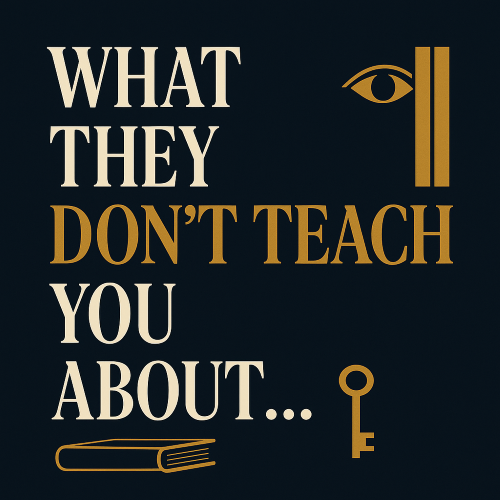"What they don't teach you" on religion-Personal Identity:

"What they don't teach you" about the complexities of religion, when truly grappled with, offers profound benefits for an individual's personal identity, whether they are navigating their own beliefs, exploring new spiritual paths, or affirming a lack of belief. This "untaught" knowledge empowers a more informed, nuanced, and resilient sense of self.
Here's how:
1. For the Believer: Deepening and Strengthening Faith
-
From Dogma to Dynamic Understanding:
-
What's Taught: Often, religious education focuses on established doctrines, rituals, and narratives as fixed truths.
-
What's Untaught (and Helps): The historical evolution of doctrine, the diversity of interpretations within one's own tradition, the influence of culture and politics on religious practice, and the existence of doubt and dissent throughout religious history.
-
Benefit for Identity: Grappling with this complexity moves faith from a rigid, external set of rules to a living, breathing tradition. It allows individuals to:
-
Own their faith: They can engage critically with scripture and tradition, forming their own informed interpretation rather than simply accepting inherited ones.
-
Resilience to Doubt: When faced with difficult questions, scientific challenges, or perceived hypocrisy, an understanding of historical evolution and internal debate provides tools to navigate doubt without feeling their entire faith crumbling. They learn that questioning is part of the journey, not a sign of weakness.
-
Nuanced Belonging: They can find their place within a broader tradition, even if they disagree with certain elements, by understanding the spectrum of belief within it. This fosters a more authentic, less guilt-ridden connection.
-
-
-
Beyond Insular Thinking:
-
What's Taught: Sometimes, religious education can unintentionally foster an "us vs. them" mentality, presenting one's own faith as the exclusive path to truth.
-
What's Untaught (and Helps): The shared human experiences addressed by various religions, the philosophical commonalities, and the deep ethical insights found across diverse traditions.
-
Benefit for Identity: This broadens a believer's worldview, fostering humility and empathy. Their identity becomes less about being "right" and more about pursuing truth and meaning. They can feel secure in their own faith while respecting and even learning from others.
-
2. For the Explorer/Seeker: Informed Spiritual Journey
-
Navigating a Diverse Landscape:
-
What's Taught: Little to nothing about the nuances of world religions beyond superficial facts, and even less about indigenous spiritualities, non-theistic paths, or new religious movements.
-
What's Untaught (and Helps): The rich tapestry of global spiritualities, the diverse ways humans seek meaning, the historical origins and transformations of various traditions, and the critical tools to evaluate different belief systems.
-
Benefit for Identity: For someone exploring their spiritual path, this knowledge provides:
-
Clearer Direction: Instead of random exploration, they can make more informed choices about which traditions resonate with their emerging values and worldview.
-
Discernment: They gain tools to critically assess claims, identify potential pitfalls (like cultic behaviors), and differentiate between genuine spiritual growth and manipulative tactics.
-
Authentic Connection: They can build a spiritual identity that is truly chosen and deeply understood, rather than one based on superficial attraction or fleeting trends.
-
-
3. For the Non-Believer/Atheist/Agnostic: Refined Understanding and Affirmation
-
Moving Beyond Superficial Rejection:
-
What's Taught: Often nothing specific about the reasons for non-belief, or sometimes negative stereotypes about those who don't believe.
-
What's Untaught (and Helps): The philosophical arguments for non-belief, the diverse forms of atheism/agnosticism/humanism, and a deep understanding of what religion actually is beyond fundamentalist caricatures.
-
Benefit for Identity: For those who don't believe, this knowledge empowers them to:
-
Articulate Their Position: They can articulate why they don't believe, or what they find unconvincing, with intellectual rigor, rather than just emotional rejection.
-
Challenge Misconceptions: They are better equipped to challenge stereotypes about non-believers and demonstrate that a lack of religious faith does not equate to a lack of morality, meaning, or purpose.
-
Appreciate Cultural Contributions: They can appreciate religion's vast contributions to art, philosophy, ethics, and social movements without subscribing to its theological claims. This fosters a more complete understanding of human history and culture, enriching their own worldview.
-
Form a Positive Identity: Rather than defining themselves solely by what they don't believe, they can understand and embrace positive non-theistic frameworks like humanism, secularism, or naturalism, which offer their own ethical and philosophical foundations.
-
-
In sum, grappling with the complexities of religion – its history, diversity, internal debates, and societal intersections – transforms personal identity from a potentially unexamined inheritance or a reactive rejection into a consciously constructed, critically informed, and deeply meaningful sense of self, whether that self is religious, spiritual, or secular. It's about building an identity on understanding, not just assumption.
- Questions and Answers
- Opinion
- Motivational and Inspiring Story
- Technology
- Live and Let live
- Focus
- Geopolitics
- Military-Arms/Equipment
- Sicurezza
- Economy
- Beasts of Nations
- Machine Tools-The “Mother Industry”
- Art
- Causes
- Crafts
- Dance
- Drinks
- Film/Movie
- Fitness
- Food
- Giochi
- Gardening
- Health
- Home
- Literature
- Music
- Networking
- Altre informazioni
- Party
- Religion
- Shopping
- Sports
- Theater
- Health and Wellness
- News
- Culture

